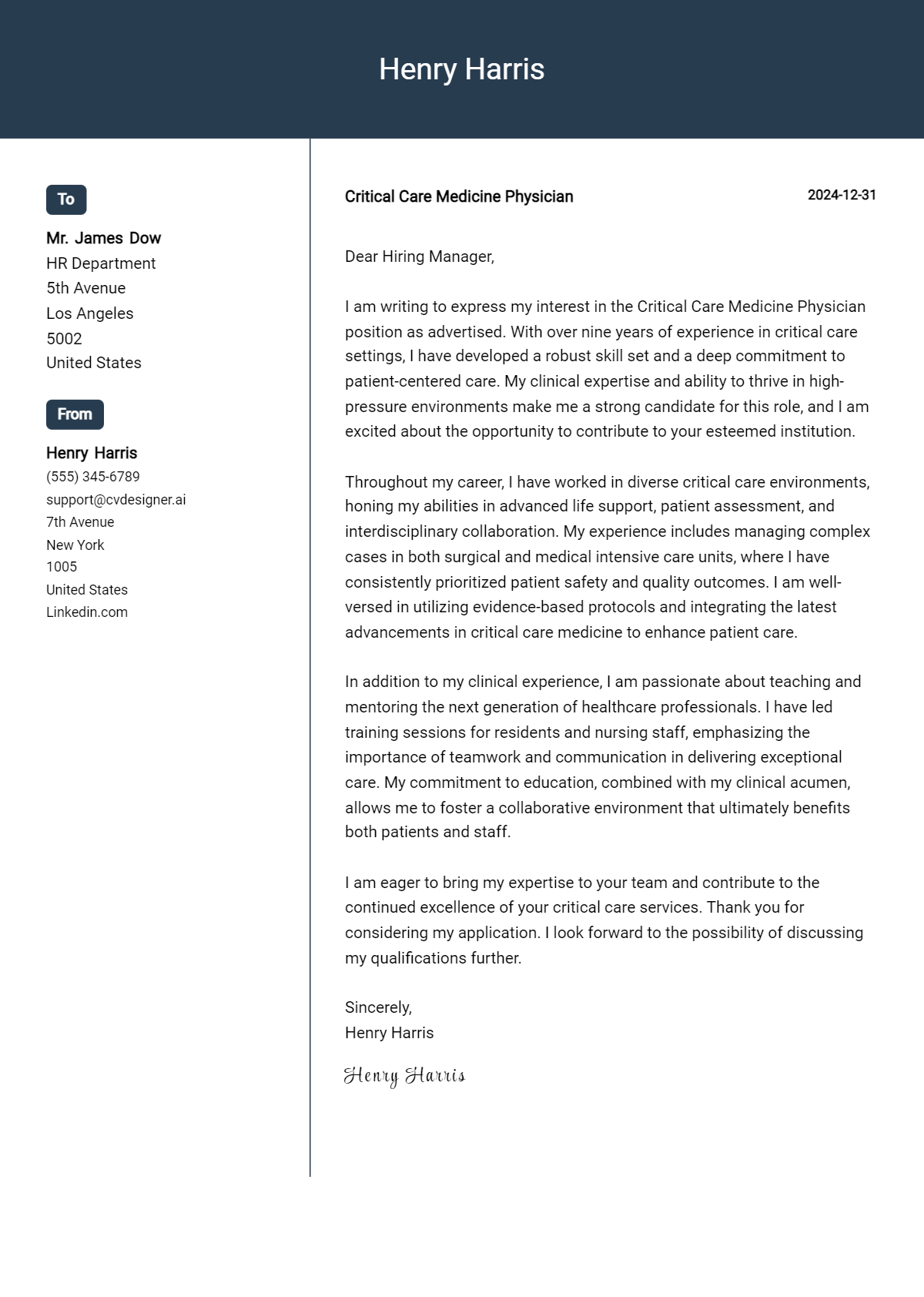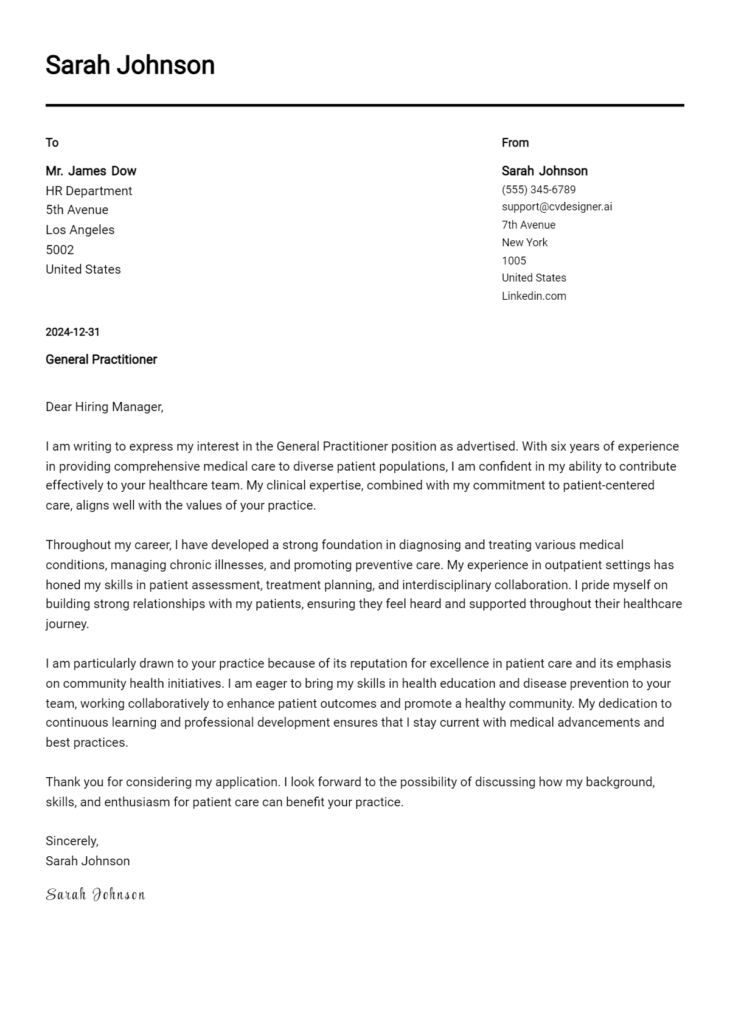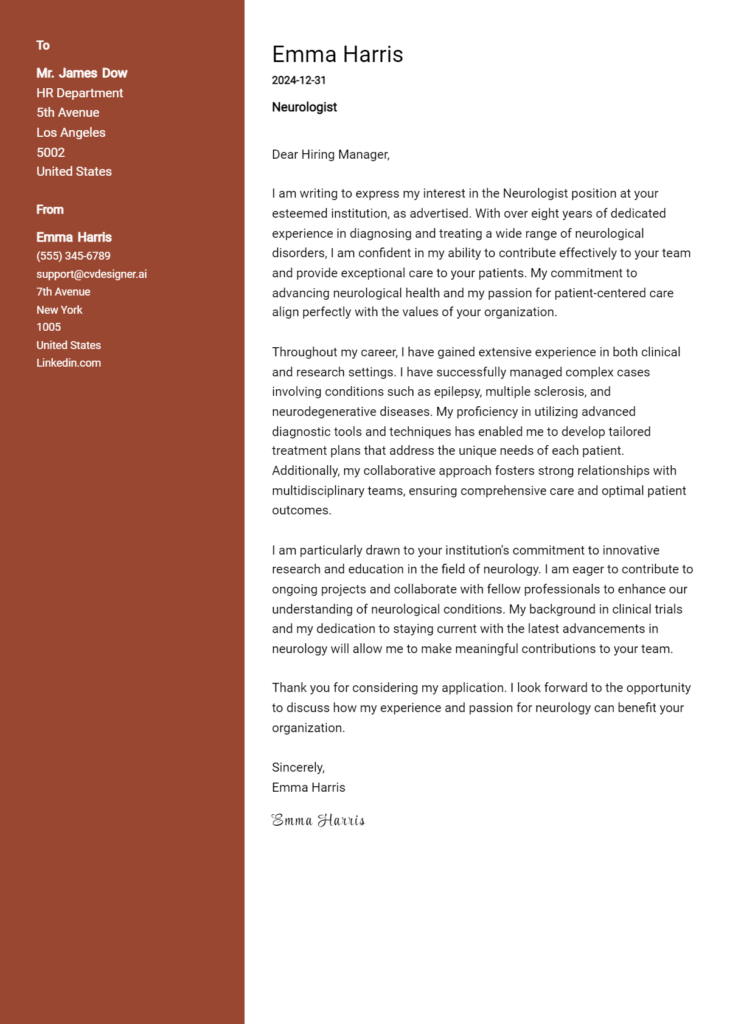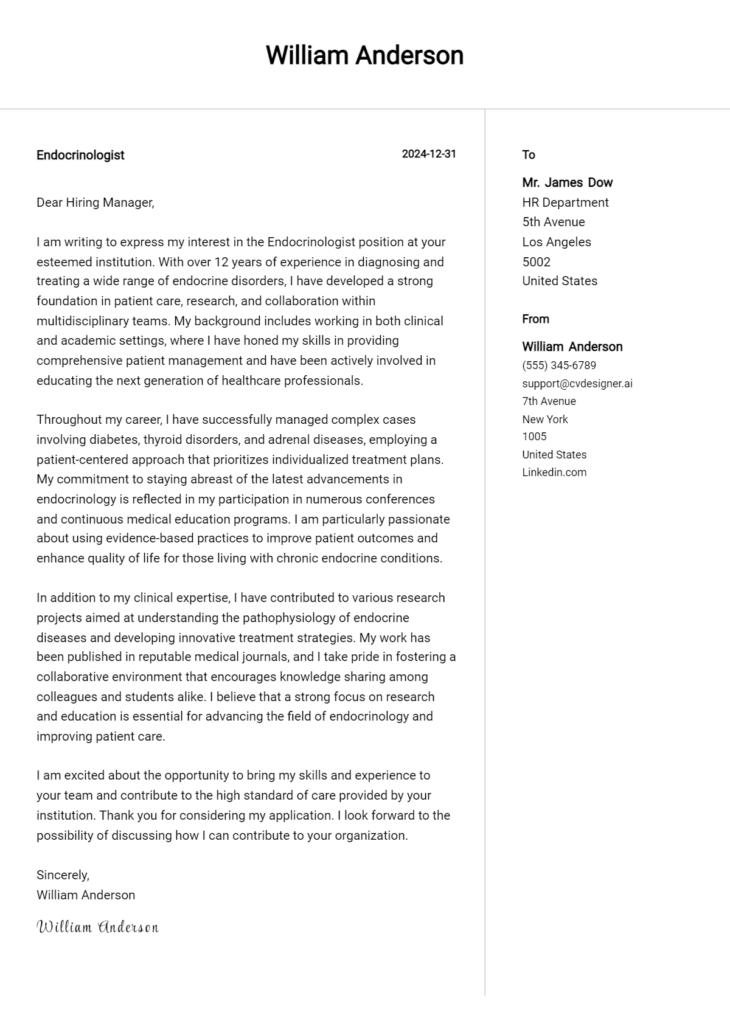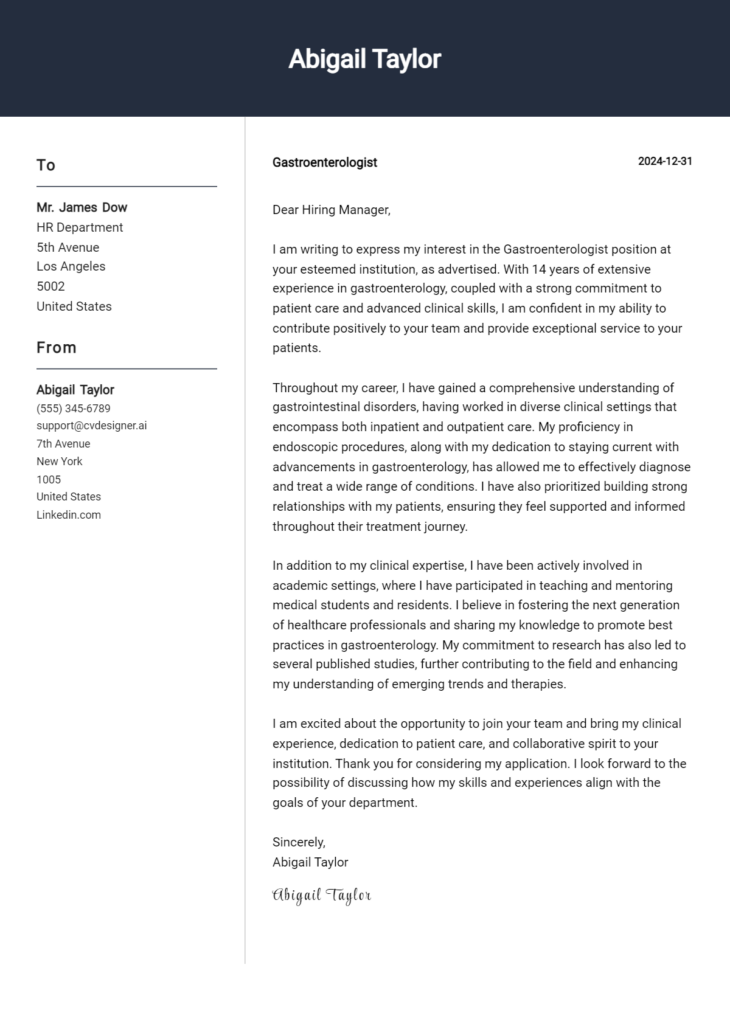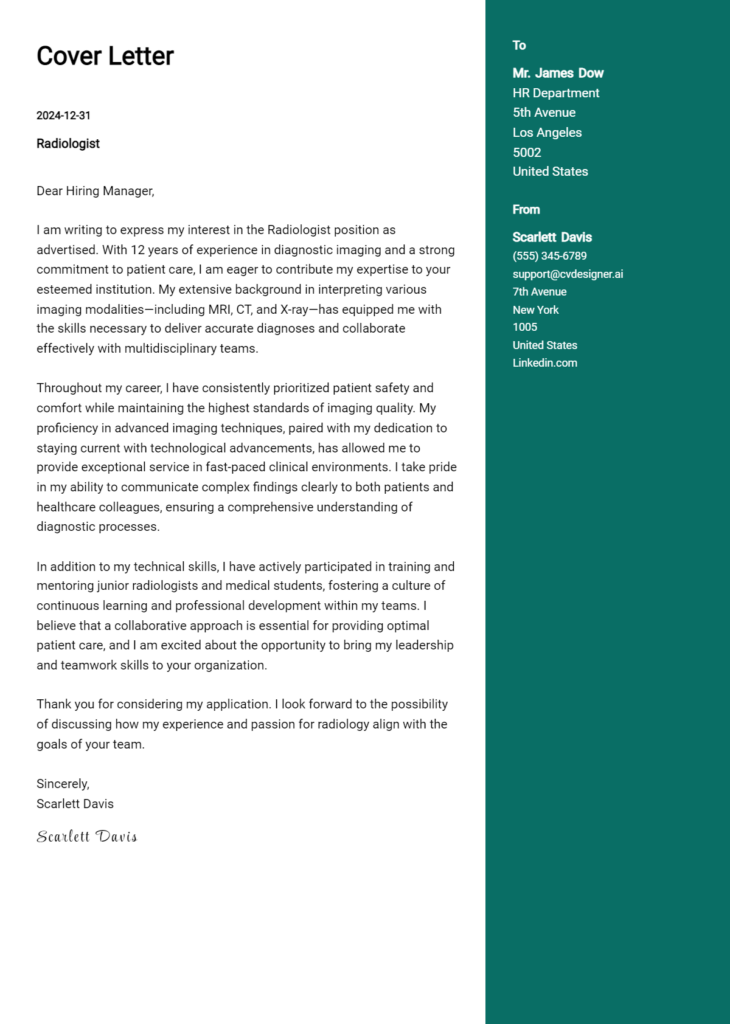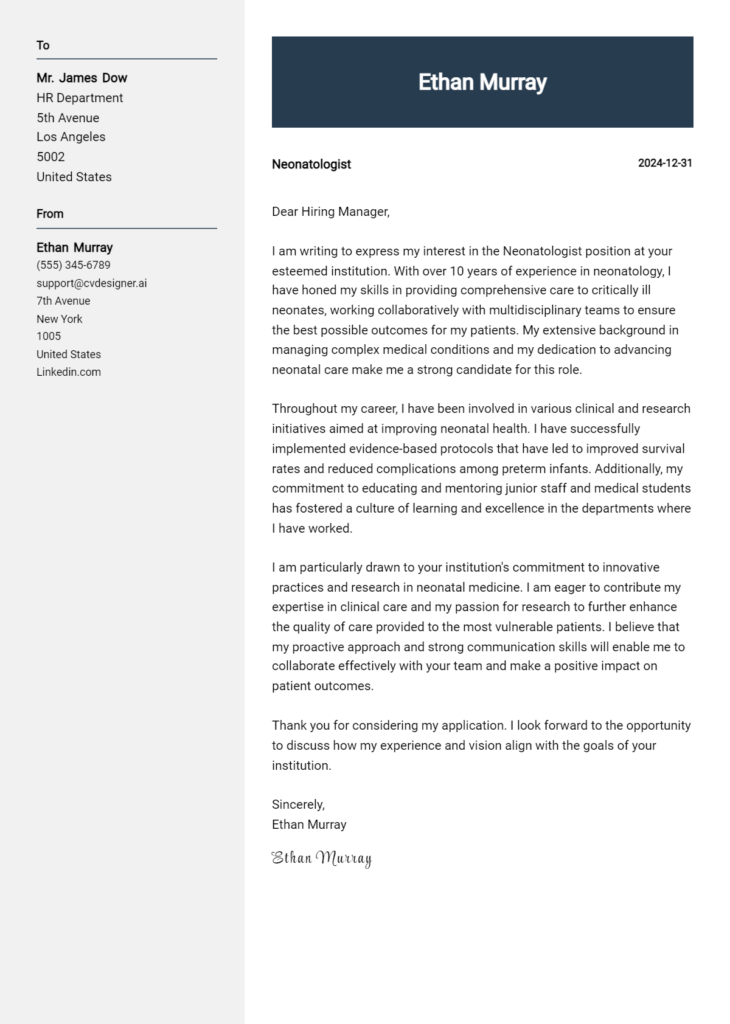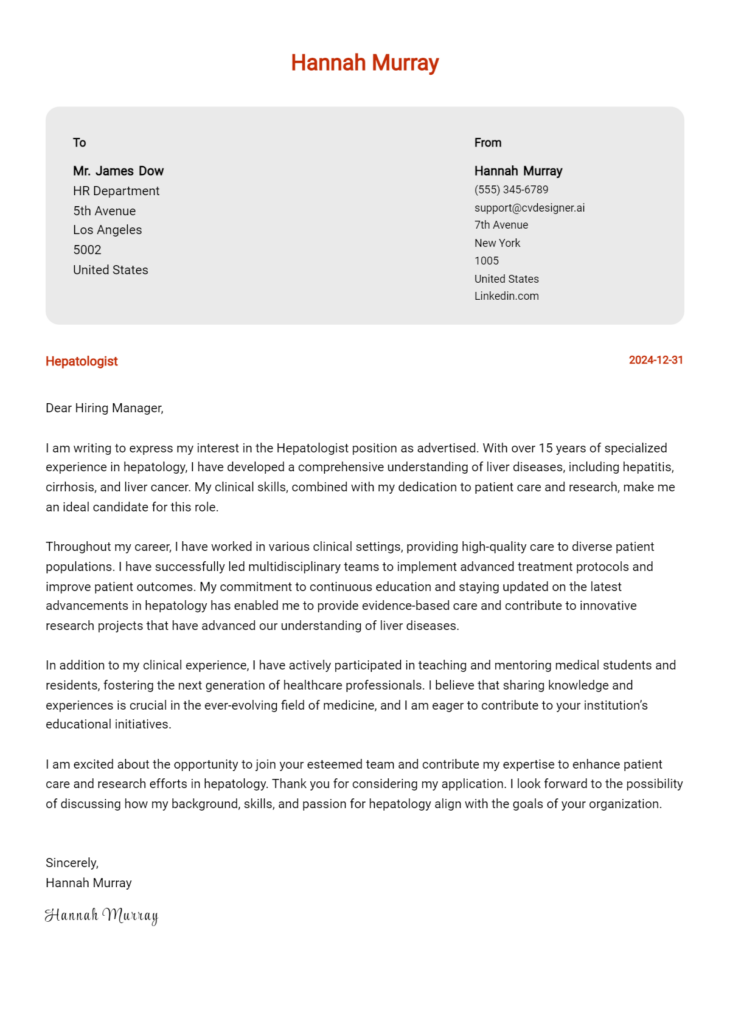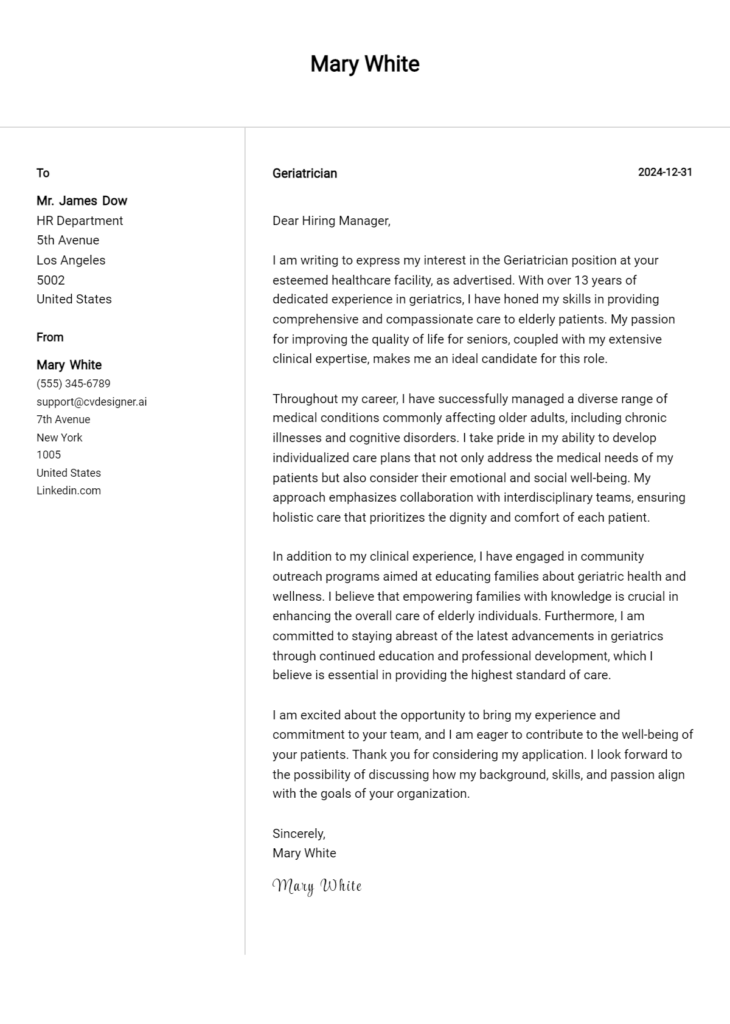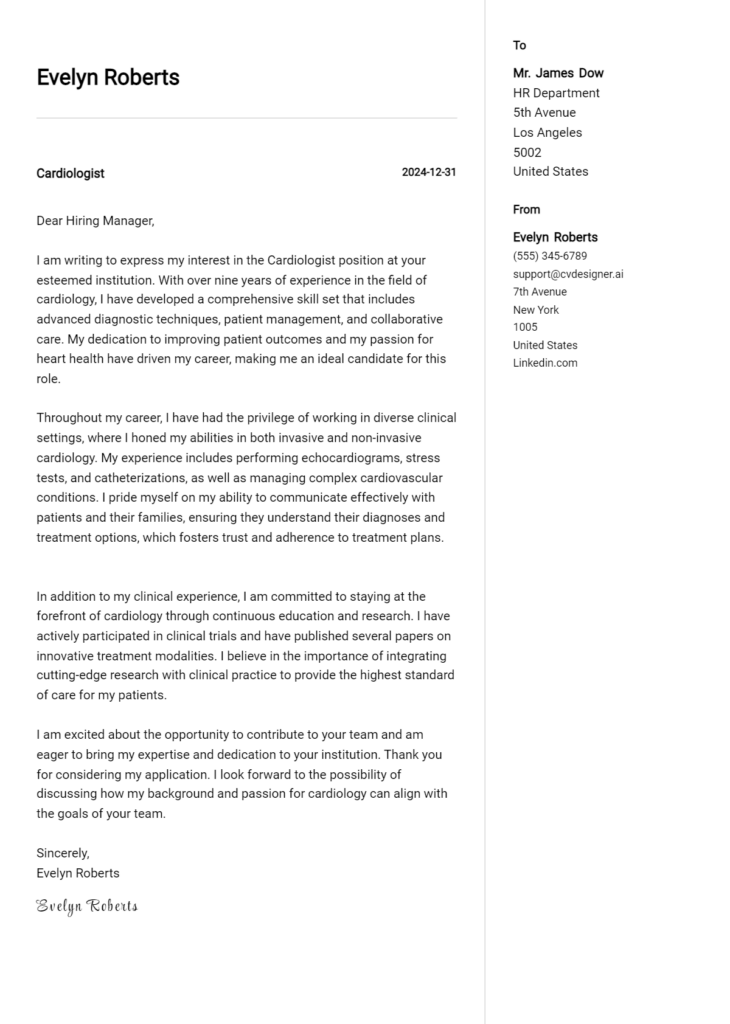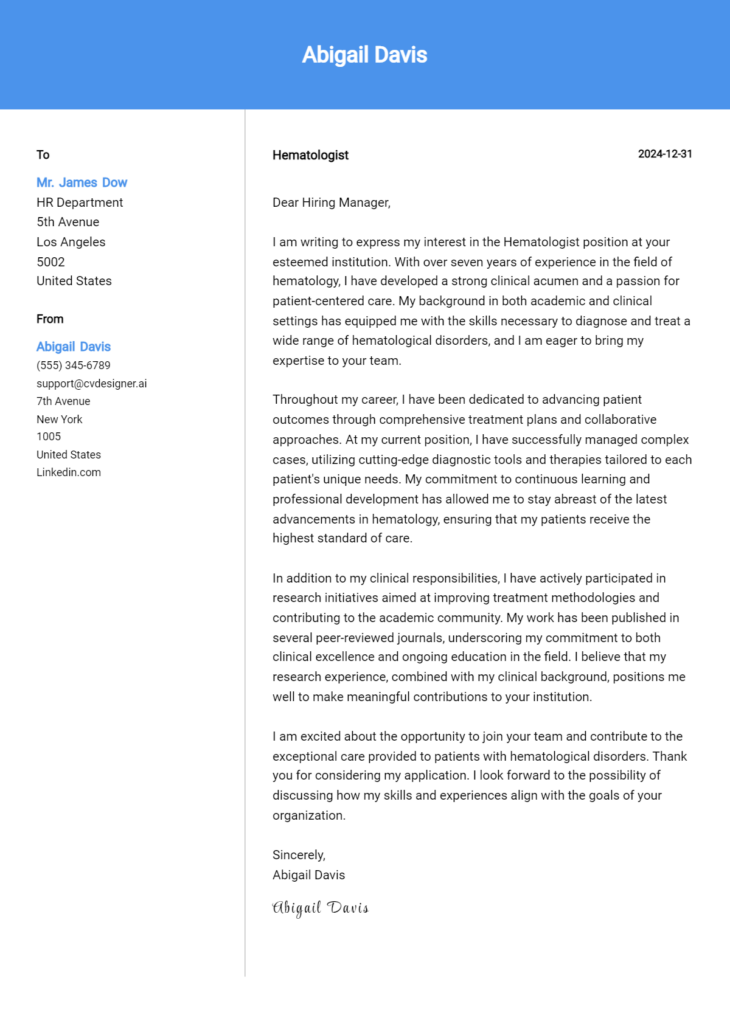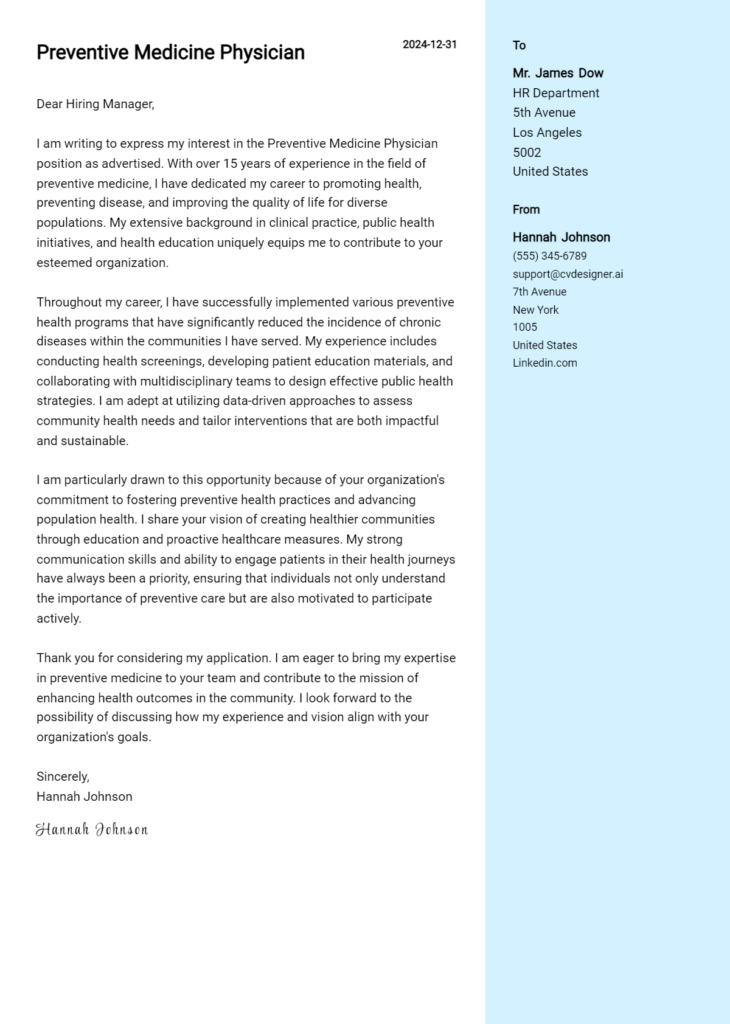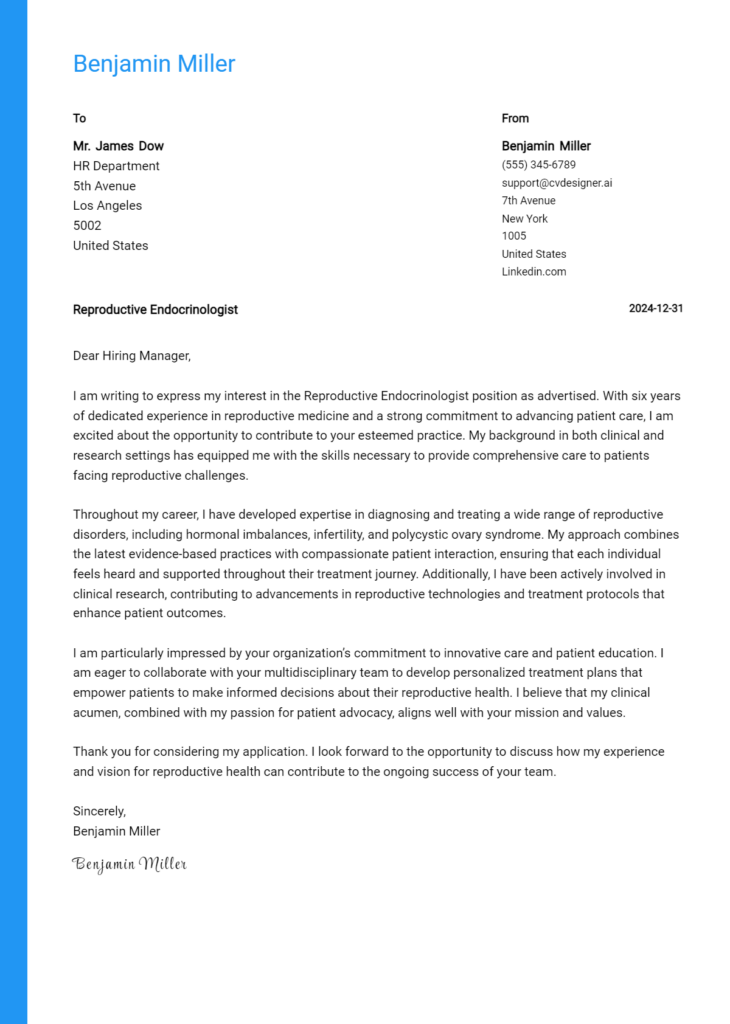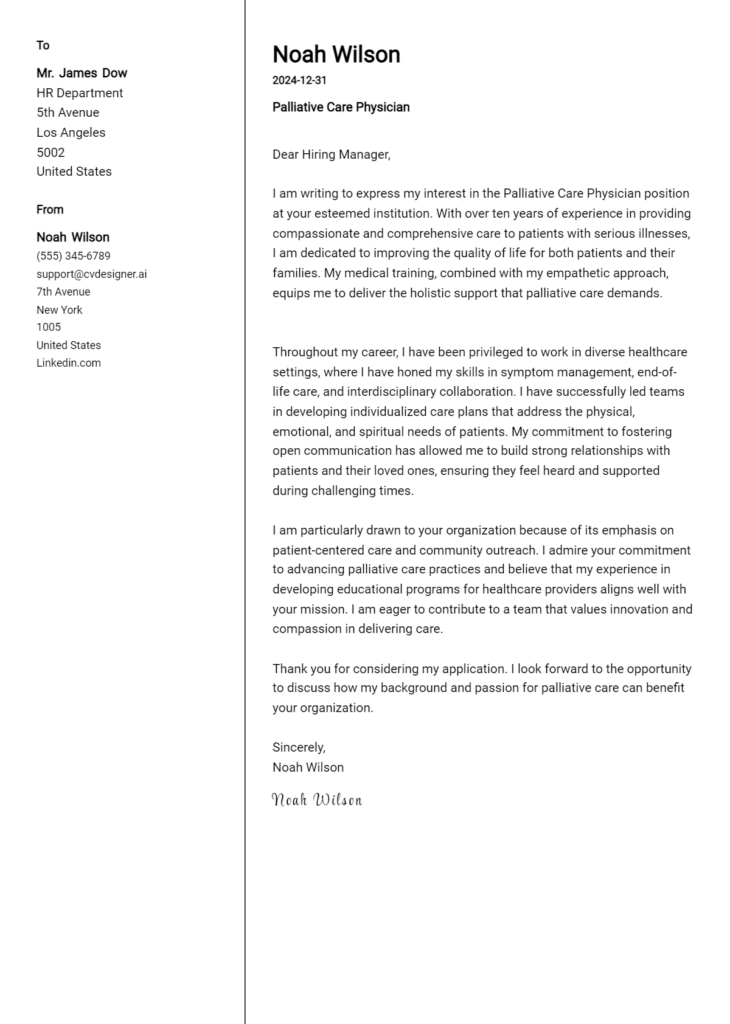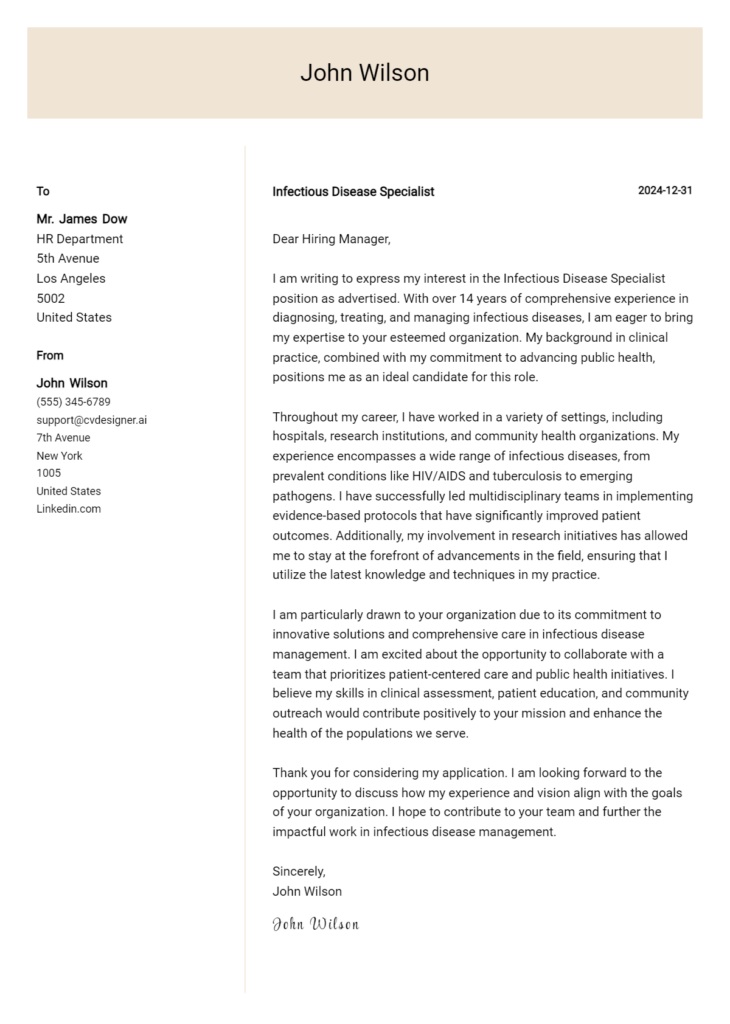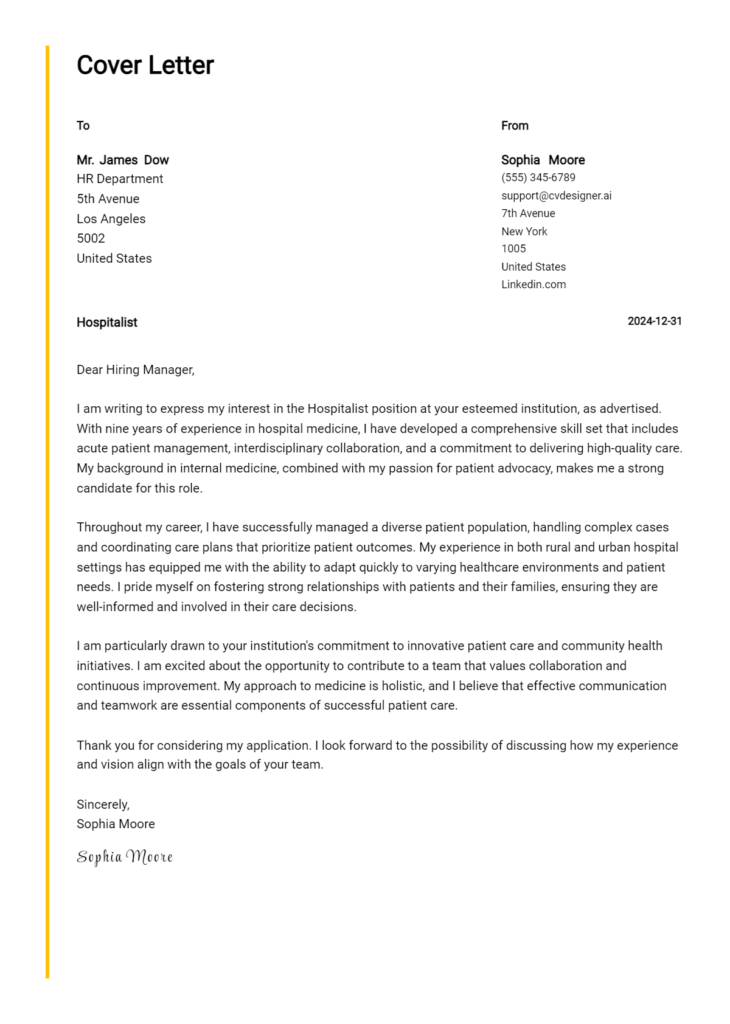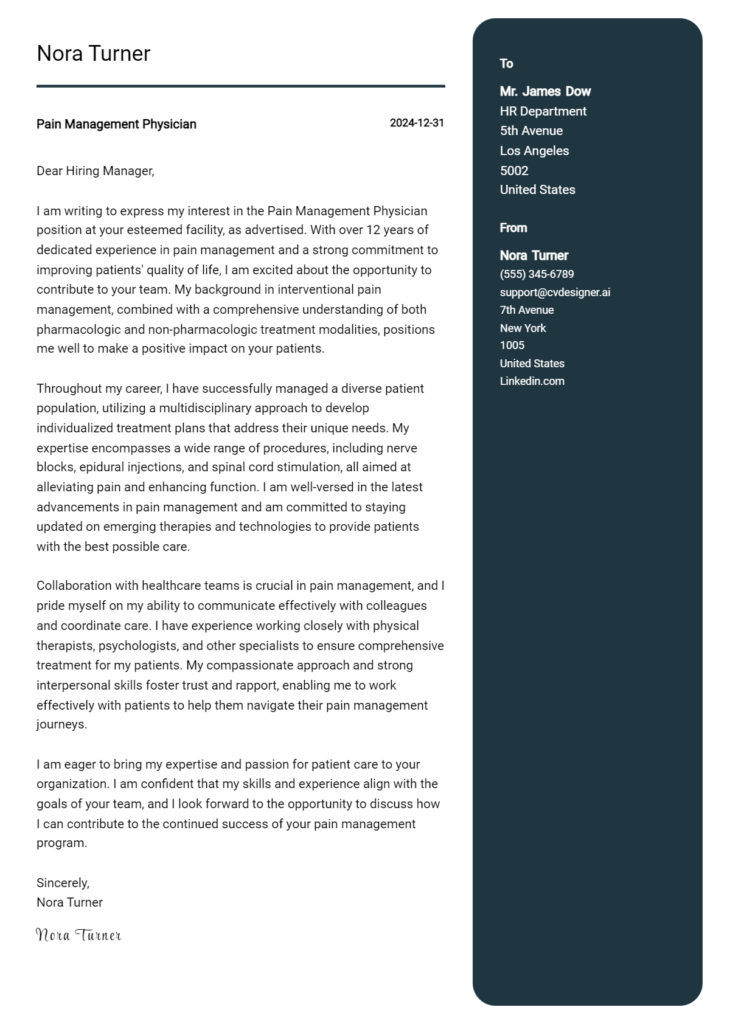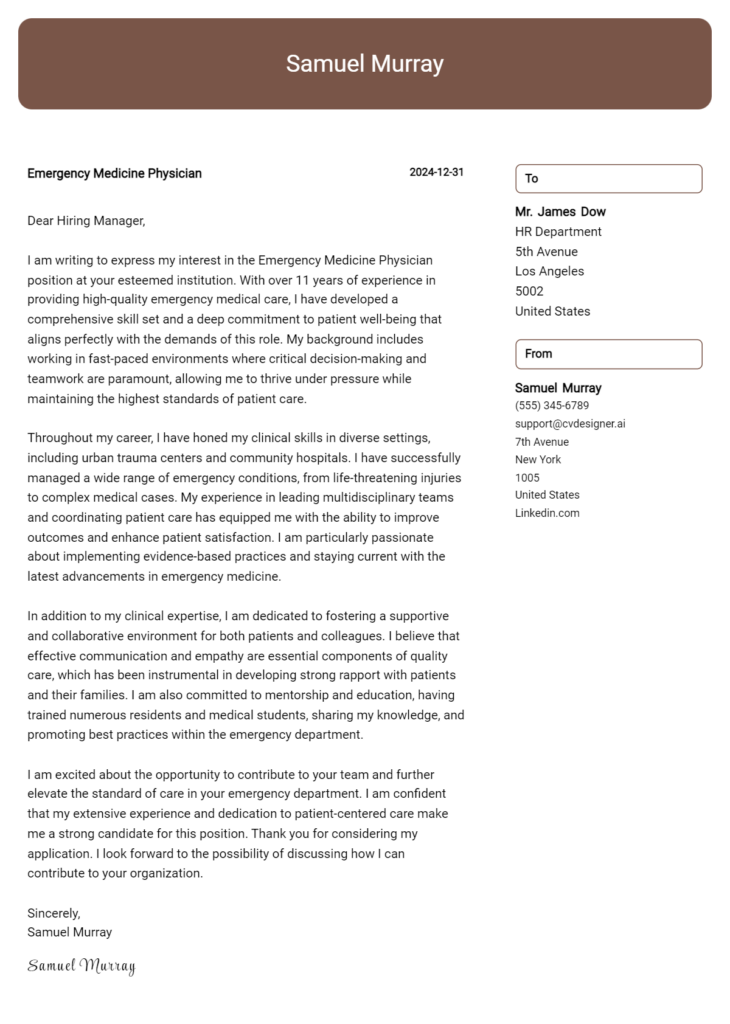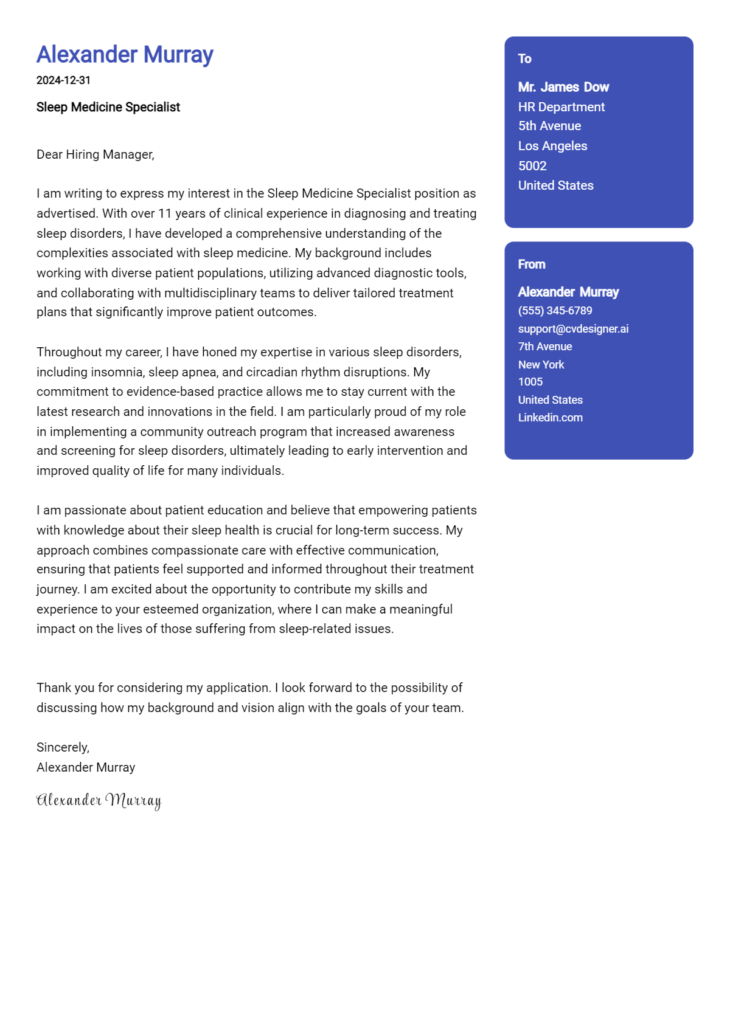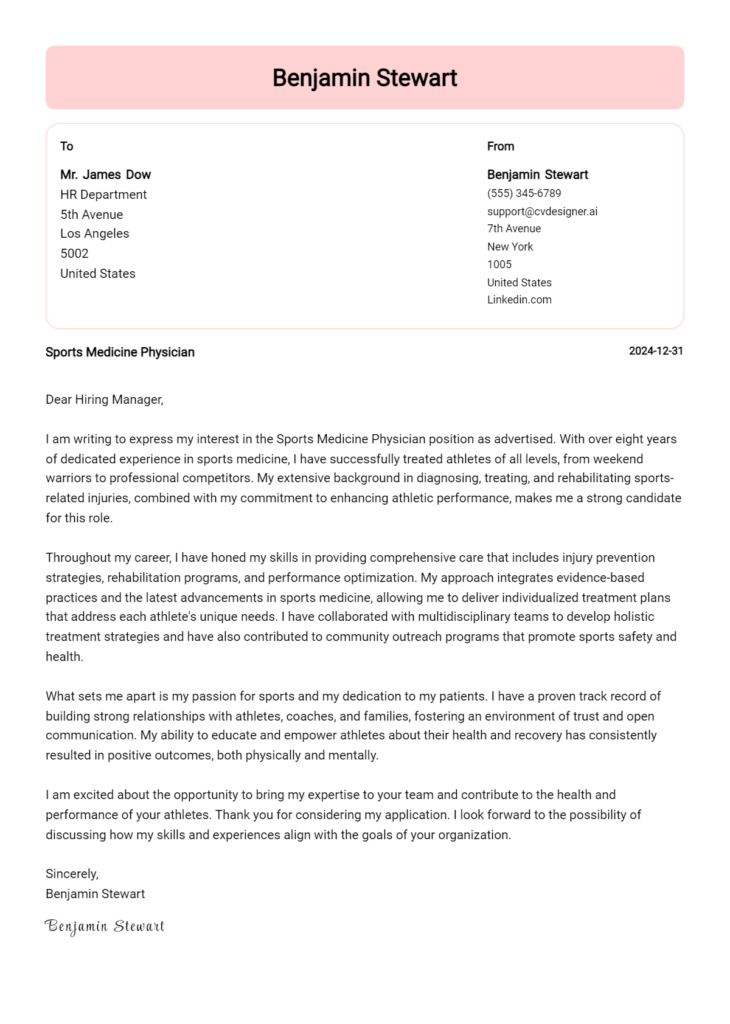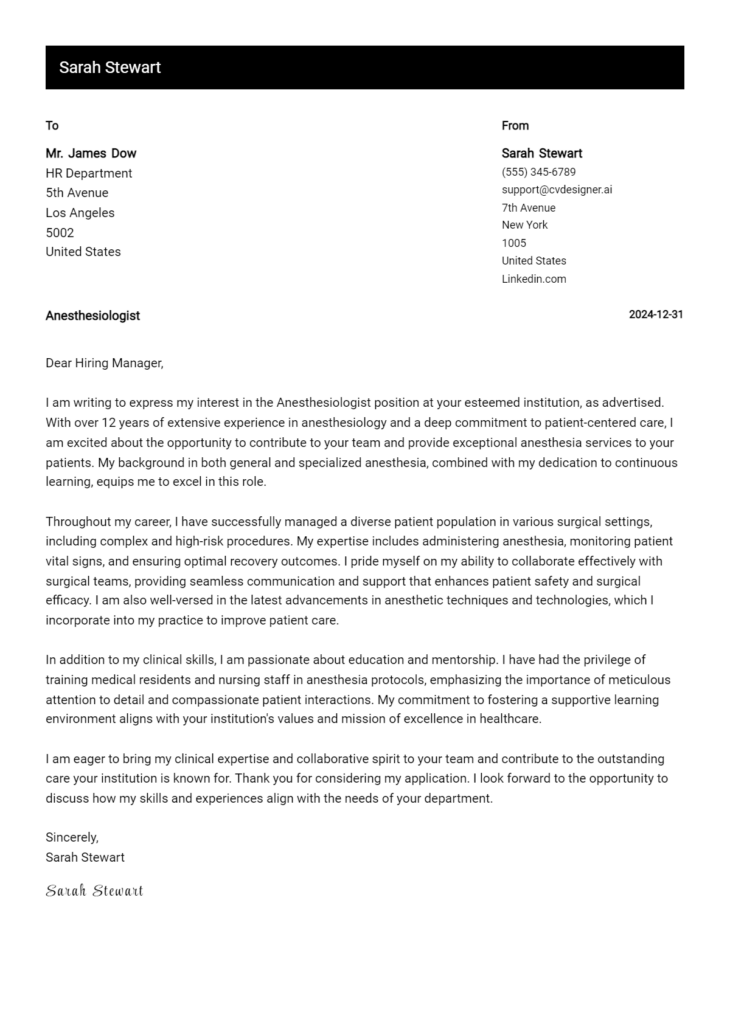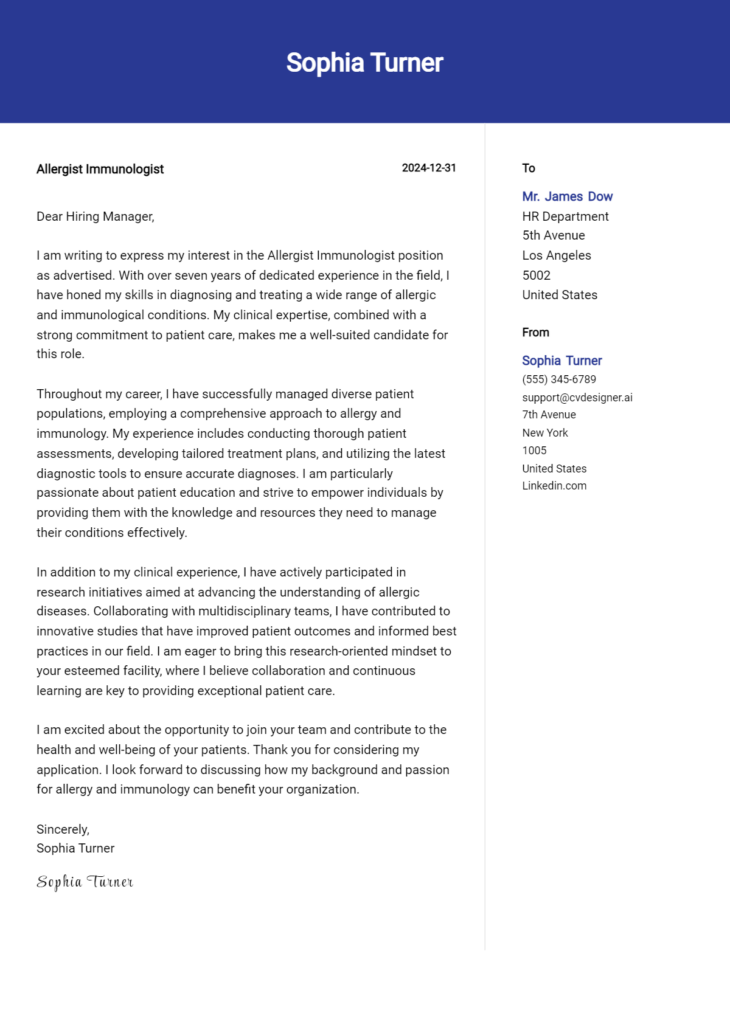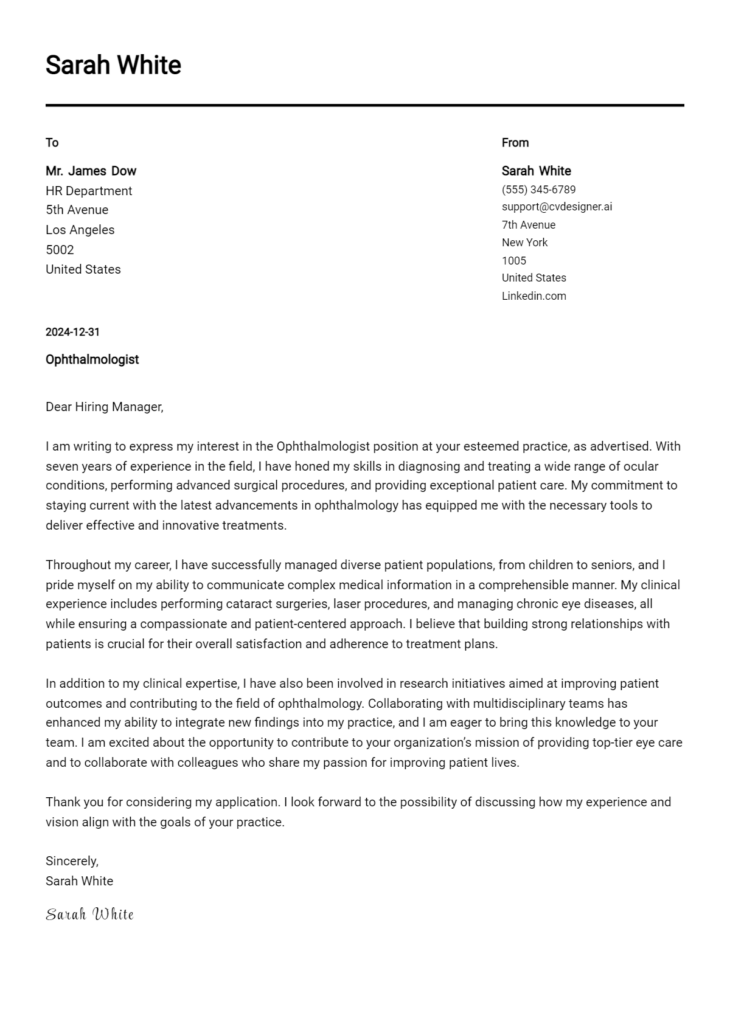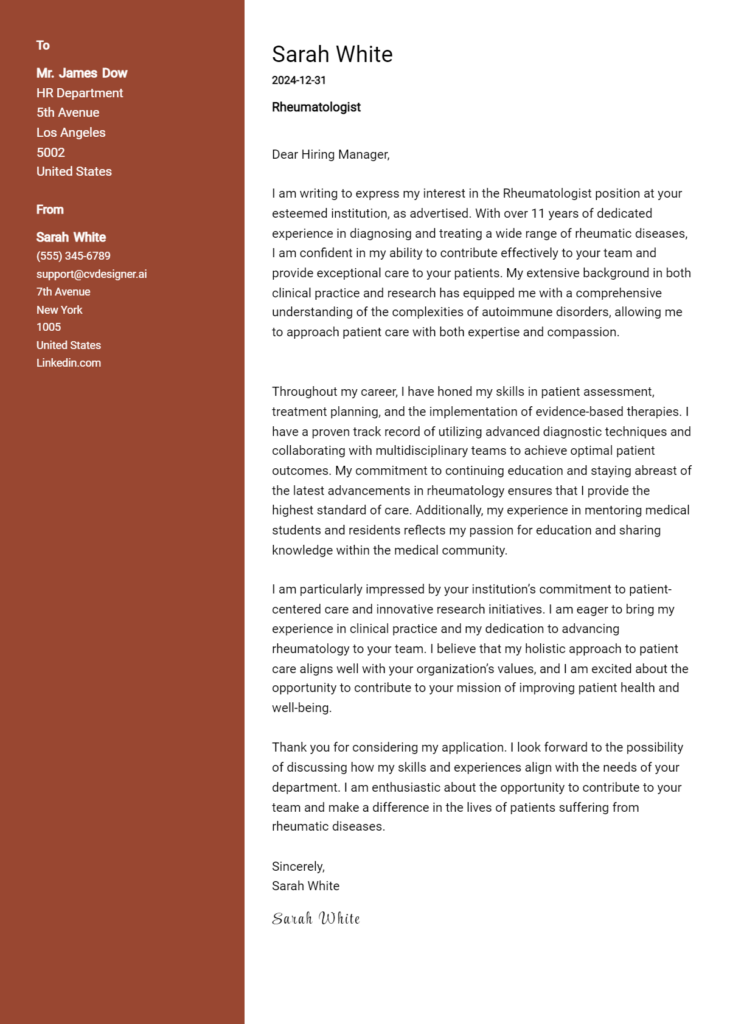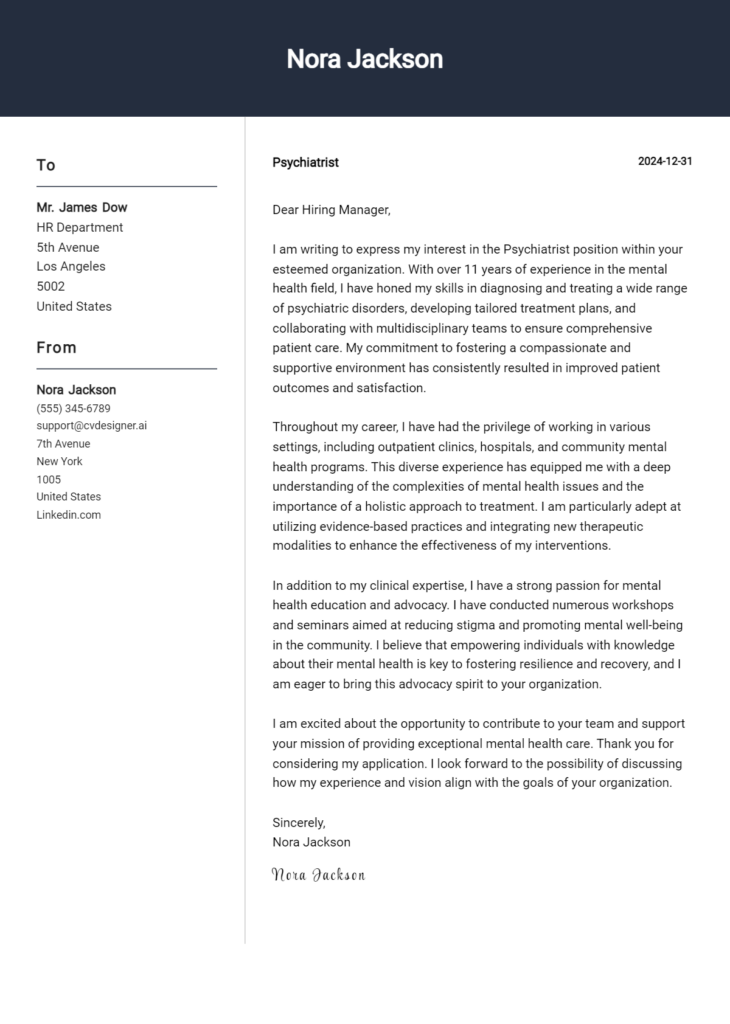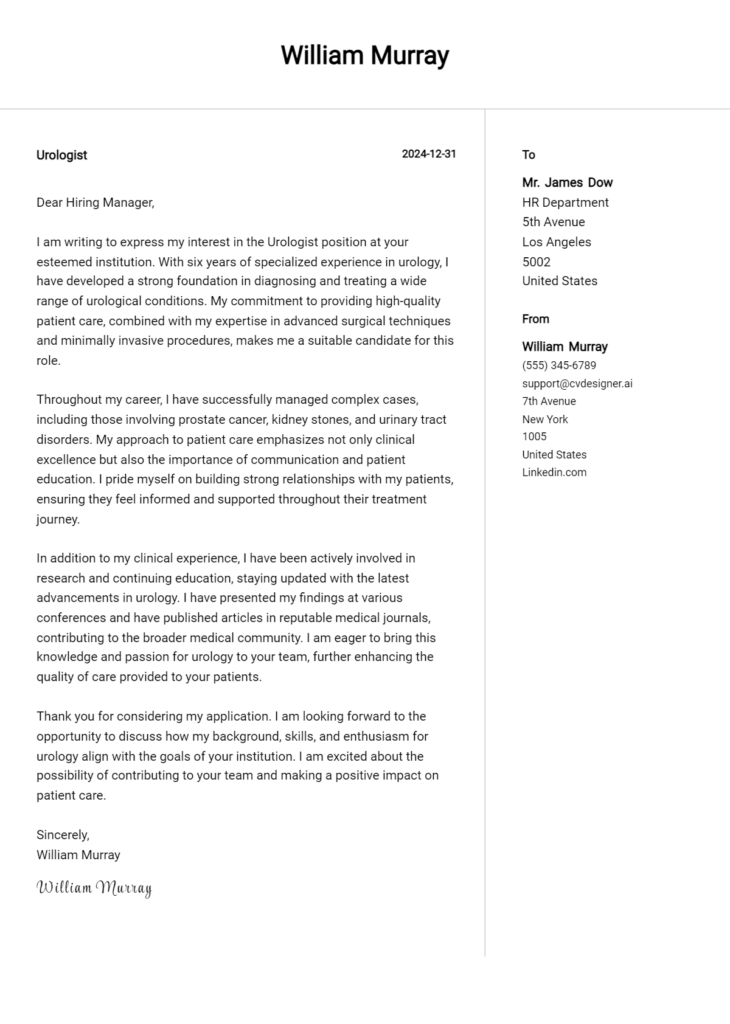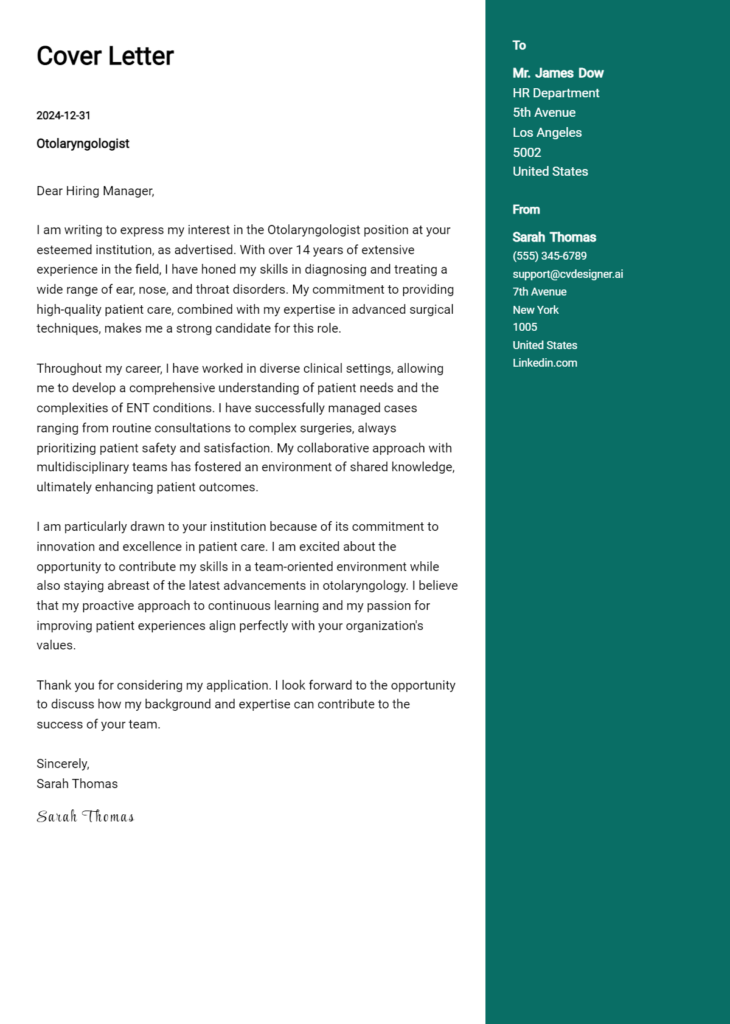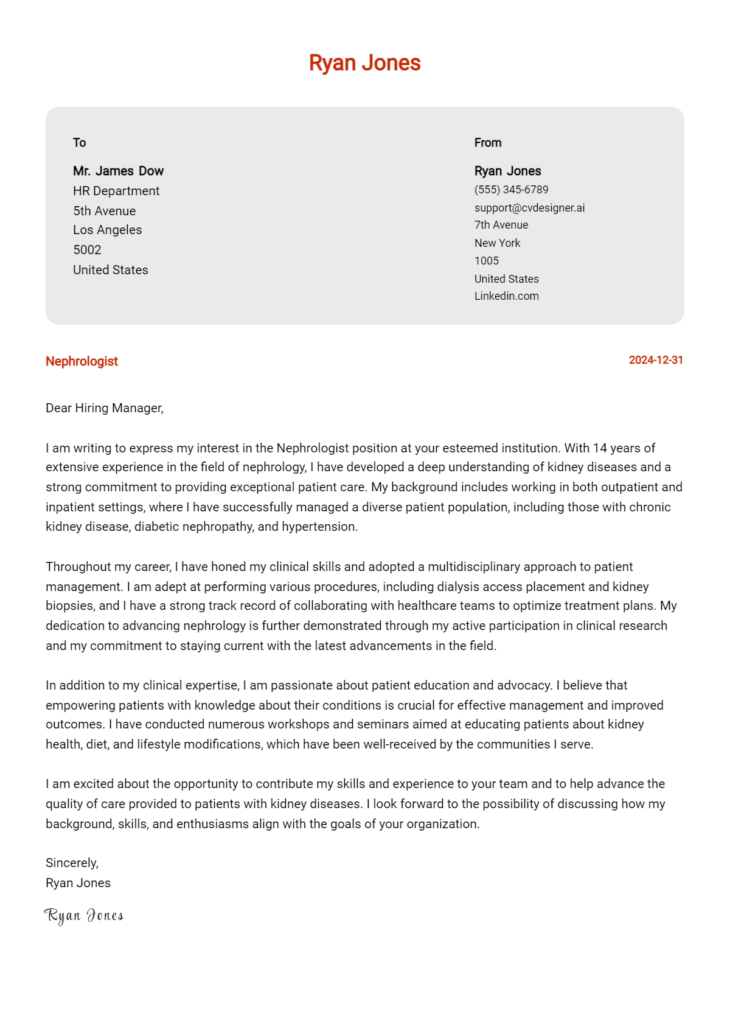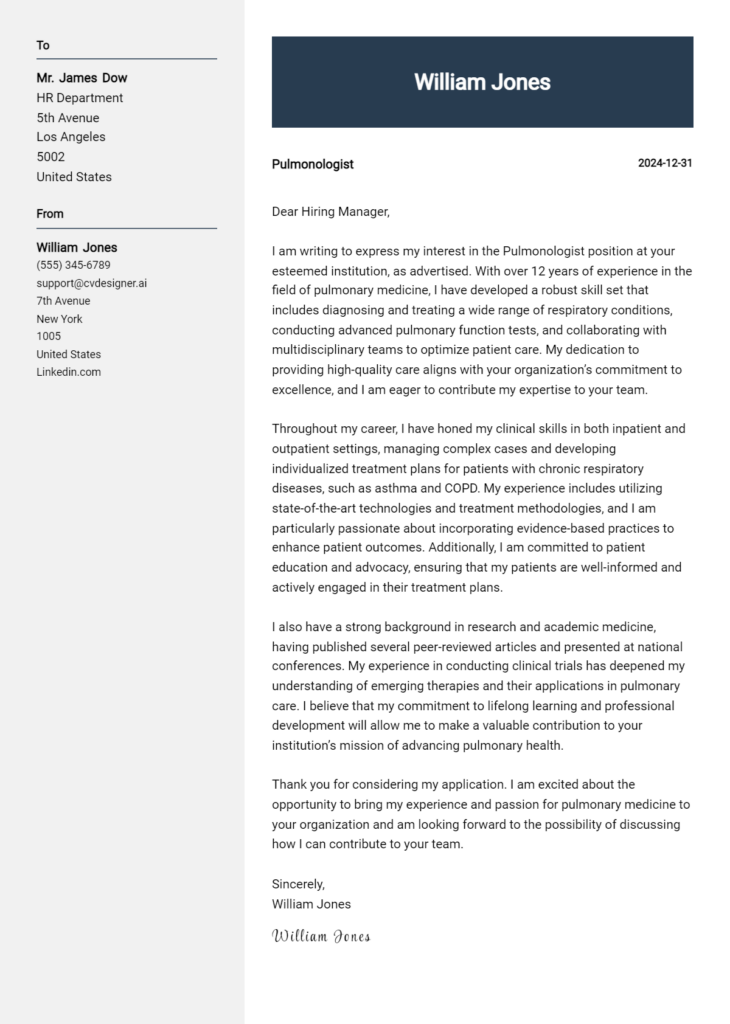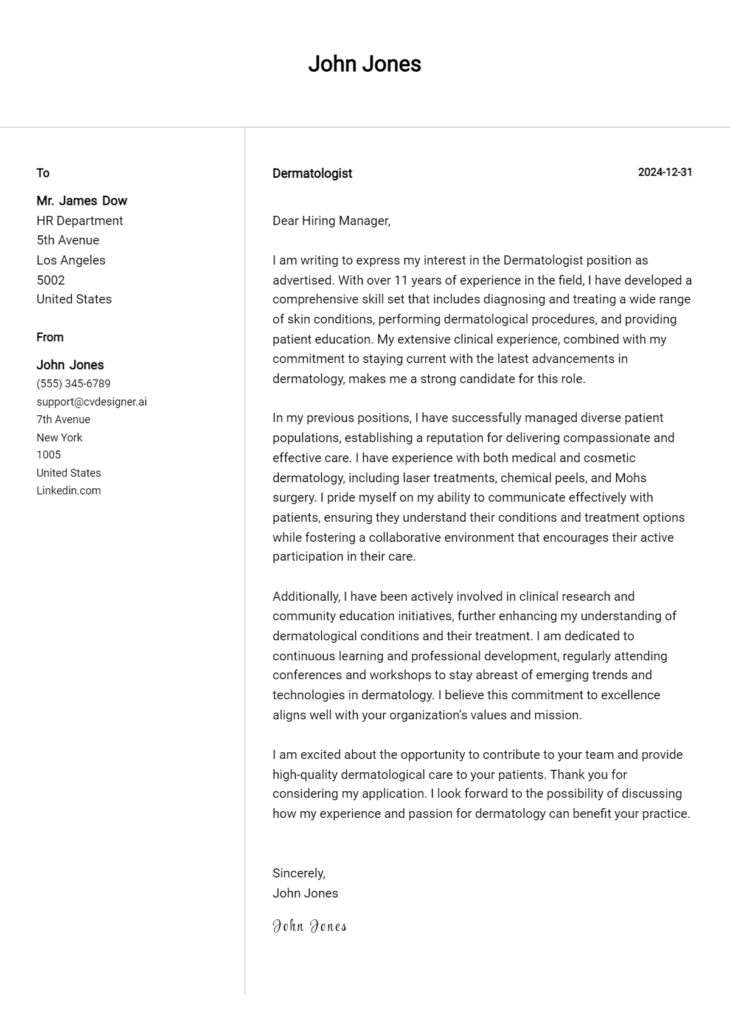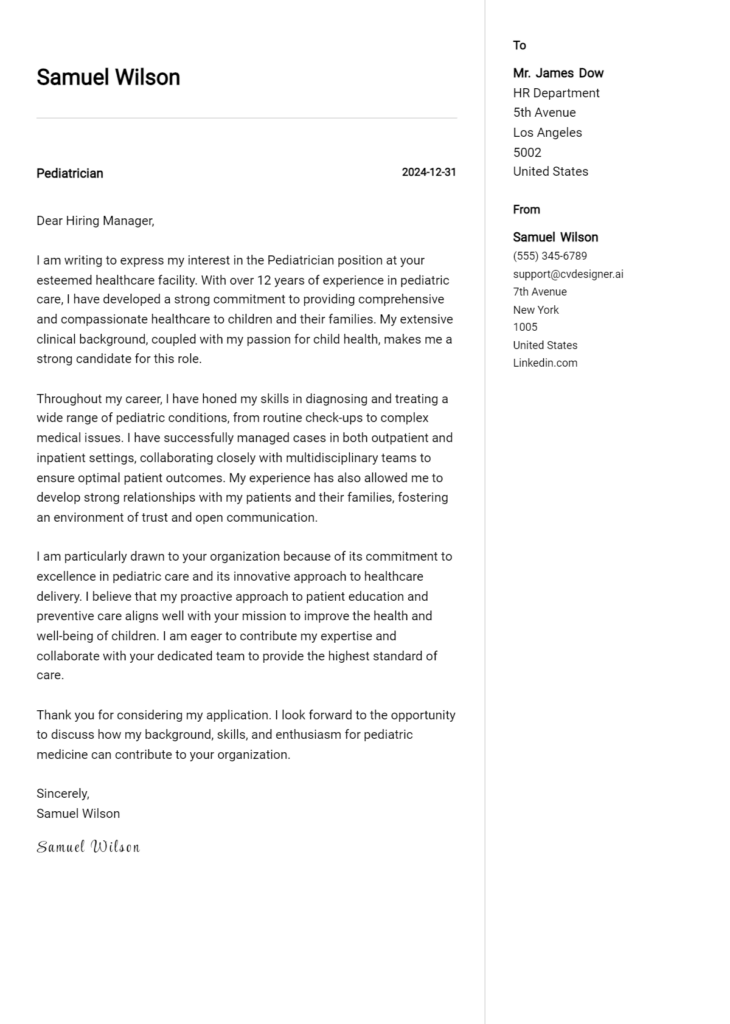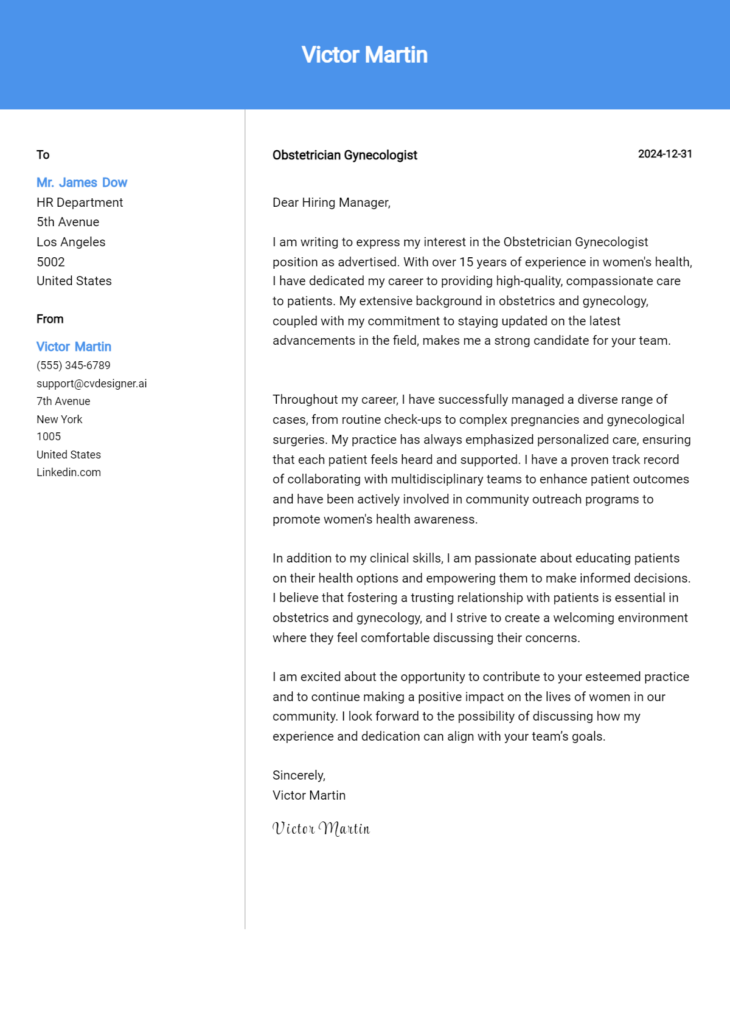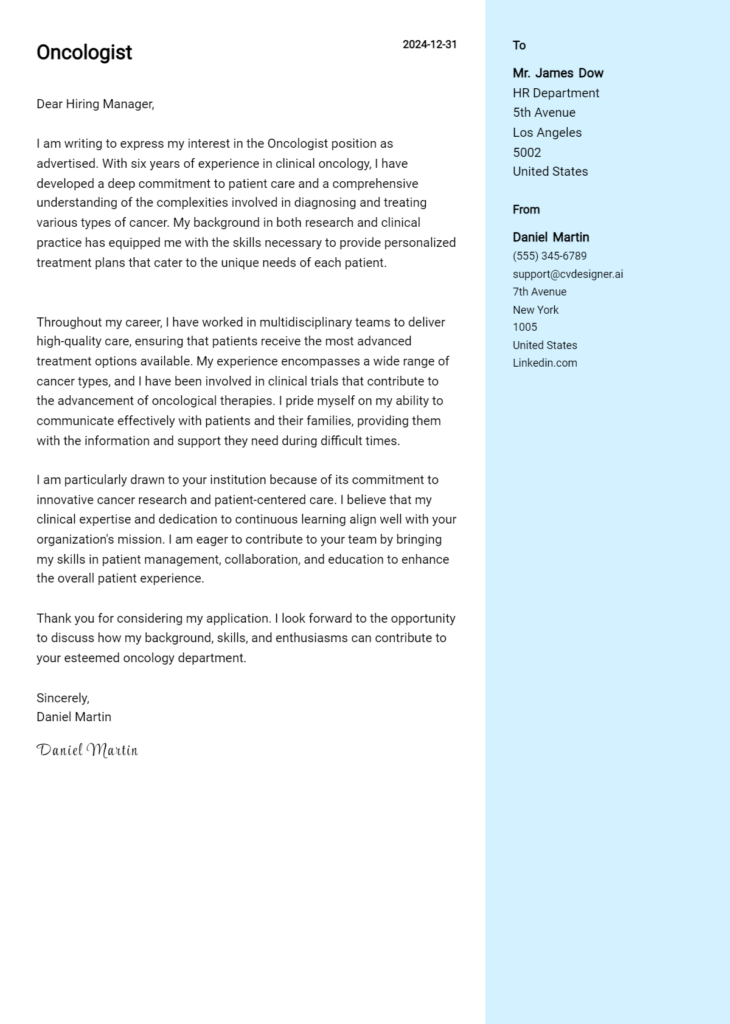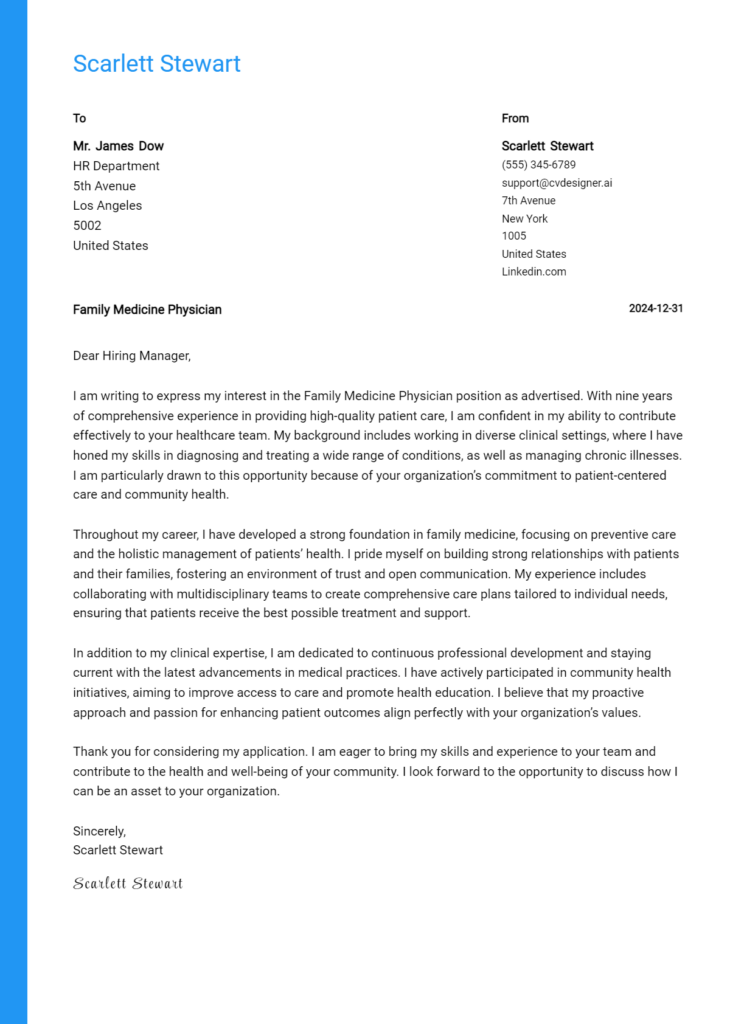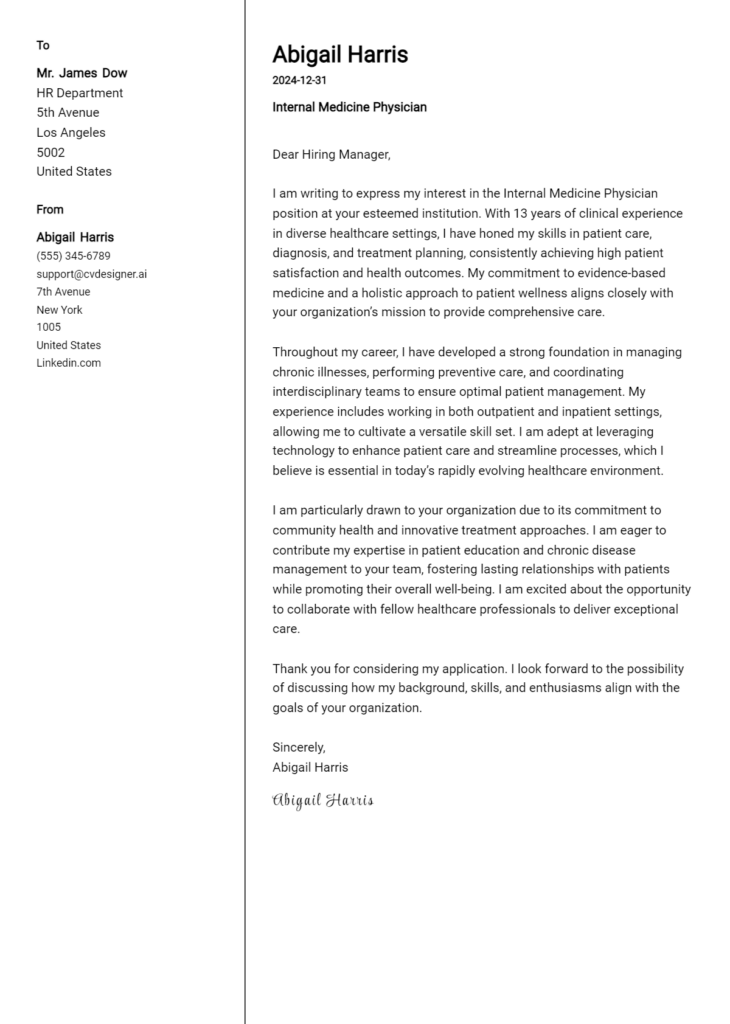Critical Care Medicine Physician Cover Letter Examples
Explore additional Critical Care Medicine Physician cover letter samples and guides and see what works for your level of experience or role.
How to Format a Critical Care Medicine Physician Cover Letter?
Crafting a compelling cover letter is essential for a Critical Care Medicine Physician, as it serves as a critical introduction to your clinical skills and experience. The way you format and present your cover letter can significantly impact your chances of making a lasting impression on hiring managers. A well-structured cover letter not only showcases your medical expertise but also demonstrates your ability to communicate effectively and your attention to detail—both crucial attributes in the high-stakes environment of critical care medicine.
In this guide, we'll explore how to structure your cover letter, providing insights and examples tailored specifically for Critical Care Medicine Physicians.
We'll focus on the essential components of a professional cover letter, including:
- Cover Letter Header
- Cover Letter Greeting
- Cover Letter Introduction
- Cover Letter Body
- Cover Letter Closing
Each section plays a vital role in highlighting your qualifications and professionalism. Let’s break down each part to ensure your cover letter stands out in a competitive field.
Importance of the Cover Letter Header for a Critical Care Medicine Physician
A well-structured cover letter header is crucial for a Critical Care Medicine Physician as it sets the tone for the entire application. The header should include essential information such as your contact details, the date, and the recipient's information. This not only ensures clarity but also conveys professionalism, which is vital in the medical field. A clear header allows hiring managers to easily identify your application and facilitates communication.
Here are examples of both a strong and a weak cover letter header:
Strong Example
Dr. Jane Smith, MD 1234 Medical Lane Cityville, ST 12345 jane.smith@email.com (123) 456-7890 [Date] Dr. John Doe Chief of Critical Care Healthcare Facility Name 5678 Hospital Road Townsville, ST 67890
Weak Example
Jane S. 1234 St. 1/1/2023 To Whom It May Concern
The Importance of a Strong Cover Letter Greeting
The greeting of your cover letter serves as the first impression for the hiring manager and sets the tone for the entire letter. A well-crafted greeting demonstrates professionalism and personalization, showing that you have taken the time to address the recipient directly. This attention to detail can significantly enhance your chances of making a positive impact. To avoid sounding generic, it's crucial to research the hiring manager's name and title whenever possible. A personalized greeting not only reflects your enthusiasm for the position but also indicates your commitment to the application process.
Strong Greeting Example
Dear Dr. Smith,
Weak Greeting Example
To Whom It May Concern,
The Importance of a Well-Crafted Cover Letter Introduction for a Critical Care Medicine Physician
The introduction of a cover letter serves as the first point of engagement with the hiring manager, making it crucial in establishing a strong impression. For a Critical Care Medicine Physician, this section should not only capture attention but also express genuine enthusiasm for the position while succinctly highlighting the candidate’s relevant skills and achievements. A compelling introduction can set the tone for the entire application, showcasing the candidate's expertise and aligning it with the needs of the institution. Below are examples of both strong and weak introductions to illustrate this point.
Strong Example
Dear [Hiring Manager's Name], As a board-certified Critical Care Medicine Physician with over eight years of experience in managing complex patient cases in high-stakes environments, I am excited to apply for the Critical Care Physician position at [Institution Name]. My commitment to delivering exceptional patient care, combined with my expertise in advanced life support techniques and multidisciplinary team collaboration, has not only improved patient outcomes but also earned recognition from my peers. I am eager to bring my skills to [Institution Name] and contribute to your mission of providing world-class critical care.
Weak Example
To Whom It May Concern, I am writing to apply for the Critical Care Medicine Physician position. I have worked in critical care before and I think I would do a good job. I have some experience with patients and I am a doctor. I hope you consider my application.
Cover Letter Body for Critical Care Medicine Physician
The body of a cover letter for a Critical Care Medicine Physician plays a crucial role in demonstrating the candidate's qualifications and fit for the position. This section should effectively highlight relevant skills, experiences, and specific accomplishments that illustrate the candidate's ability to excel in a high-pressure critical care environment. By detailing notable projects, such as leading a quality improvement initiative to reduce ventilator-associated pneumonia rates or collaborating with interdisciplinary teams to enhance patient outcomes, the candidate can convey their value to the organization. A well-crafted cover letter body not only showcases technical expertise but also reflects the physician's commitment to patient care and teamwork.
Strong Example
Dear [Hiring Manager's Name], I am writing to express my interest in the Critical Care Medicine Physician position at [Hospital/Institution Name]. With over seven years of experience in intensive care, I have successfully led a team in implementing a protocol that decreased the incidence of hospital-acquired infections by 30%. My role as a lead physician in the ICU during the COVID-19 pandemic allowed me to refine my skills in crisis management and multidisciplinary collaboration. I am particularly proud of my involvement in a project that integrated telemedicine services, which improved patient monitoring and reduced the length of stay for critically ill patients. I am eager to bring my expertise and dedication to your esteemed institution, contributing to exceptional patient care and improved outcomes. Sincerely, [Your Name]
Weak Example
Dear [Hiring Manager's Name], I am interested in the Critical Care Medicine Physician position at [Hospital/Institution Name]. I have worked in critical care for several years. I think I would be a good fit because I care about patients. I have done some work on improving care but don’t have specific numbers or projects to share. I believe that I can make a difference. Thank you for considering my application. Best, [Your Name]
Importance of the Cover Letter Closing for a Critical Care Medicine Physician
The closing paragraph of a cover letter is crucial for a Critical Care Medicine Physician as it serves to summarize qualifications, reaffirm interest in the position, and prompt the hiring committee to take the next steps, such as reviewing the resume or scheduling an interview. A strong closing not only reinforces the candidate's suitability for the role but also demonstrates professionalism and enthusiasm. Conversely, a weak closing may leave the reader uncertain about the candidate's interest or qualifications, potentially diminishing their chances of advancing in the hiring process.
Strong Example
Thank you for considering my application for the Critical Care Medicine Physician position. With my extensive training in critical care and a commitment to delivering the highest standard of patient care, I am excited about the opportunity to contribute to your esteemed team. I look forward to discussing how my skills and experiences align with your needs. Please feel free to contact me to schedule an interview at your earliest convenience. I have attached my resume for your review.
Weak Example
I hope you will look at my resume. I think I would be okay for the Critical Care Medicine Physician job. Let me know if you want to talk more, or if you have any questions.
Crafting an effective cover letter is essential for candidates applying for a Critical Care Medicine Physician position. A well-written cover letter not only highlights your technical skills and problem-solving abilities but also demonstrates your understanding of the complexities of patient care, teamwork, and your commitment to continuous learning. This guide provides you with valuable tips to create a compelling narrative that will resonate with hiring committees in the medical field.
Tips for Writing an Effective Cover Letter for Critical Care Medicine Physician
Showcase Your Technical Skills
Start your cover letter by emphasizing your technical expertise in critical care medicine. Mention specific skills such as advanced cardiovascular life support (ACLS), intubation techniques, and the use of ventilators. Providing specific examples of how you've successfully applied these skills in previous roles will set you apart from other candidates.Highlight Problem-Solving Abilities
Critical care environments often present complex challenges requiring quick and effective problem-solving. Illustrate your ability to assess situations rapidly and implement appropriate interventions. Consider sharing a brief anecdote that demonstrates your critical thinking and decision-making skills in high-pressure scenarios.Demonstrate Knowledge of the SDLC
If applicable, include your understanding of the Software Development Life Cycle (SDLC) in relation to healthcare technology. Explain how you can leverage technology to improve patient outcomes and streamline processes. This is increasingly important in today’s healthcare landscape, where data management and technological integration play a vital role.Emphasize Teamwork and Collaboration
Describe your experience working as part of a multidisciplinary team. Highlight your ability to communicate effectively with nurses, respiratory therapists, and other healthcare professionals. Share examples of how collaboration has led to improved patient care and outcomes, reinforcing your role as a team player.Convey a Passion for Continuous Learning
The field of critical care medicine is constantly evolving. Demonstrate your commitment to professional development by mentioning any additional certifications, workshops, or conferences you have attended. Express your eagerness to stay updated with the latest advancements in critical care practices, illustrating your dedication to providing the best possible care.
By incorporating these tips into your cover letter, you can create a powerful narrative that showcases your qualifications as a Critical Care Medicine Physician. For additional assistance, consider utilizing cover letter templates or a cover letter builder to streamline the writing process and ensure your letter stands out.
Common Mistakes to Avoid in a Critical Care Medicine Physician Cover Letter
Crafting an effective cover letter is essential for standing out in the competitive field of critical care medicine. Avoiding common mistakes can significantly enhance your chances of making a positive impression on hiring committees. Here are some pitfalls to steer clear of when writing your cover letter:
Generic Greetings: Using “To Whom It May Concern” shows a lack of effort. Always try to find the hiring manager’s name for a more personalized touch.
Repetition of the Resume: Simply summarizing your resume is redundant. Instead, focus on highlighting key experiences and how they relate to the position.
Lack of Specificity: Vague statements do little to impress. Use specific examples that demonstrate your skills and achievements in critical care settings.
Overly Complex Language: While medical terminology is important, avoid jargon that may not be easily understood. Clear and concise language is more effective.
Neglecting Formatting: A cluttered or unprofessional layout can detract from your message. Follow a proper cover letter format to ensure clarity and professionalism.
Ignoring the Job Description: Failing to address the key qualifications listed in the job posting can make your letter seem unfocused. Tailor your letter specifically to the role and its requirements.
Spelling and Grammar Errors: Typos can undermine your professionalism. Always proofread your letter or use tools to check for errors before submission.
By steering clear of these common mistakes and following best practices, you'll enhance your cover letter's effectiveness. For inspiration, explore various cover letter examples to see how others have successfully structured their applications.
Cover Letter FAQs for Critical Care Medicine Physician
What should I include in my cover letter for a Critical Care Medicine position?
When applying for a Critical Care Medicine Physician position, your cover letter should highlight your relevant experience, skills, and passion for critical care. Start with a strong introduction that specifies the role you're applying for. Include details about your medical education, residency, and any fellowships in critical care. Emphasize your clinical expertise, decision-making abilities under pressure, and your experience with advanced technologies and treatments. Mention any research contributions, teaching roles, or leadership positions that demonstrate your commitment to the field. Finally, convey your enthusiasm for the institution and how your values align with their mission, ensuring your cover letter is personalized and engaging.
How long should my cover letter be?
Your cover letter should ideally be one page long, consisting of 3 to 4 concise paragraphs. This length allows you to effectively communicate your qualifications and interest in the Critical Care Medicine position without overwhelming the reader. Aim for around 250 to 400 words, focusing on clarity and relevance. Each paragraph should serve a specific purpose: an introduction stating your intent, a body section detailing your qualifications and experiences, and a conclusion reiterating your enthusiasm for the role. Be mindful of formatting and readability, using professional language while ensuring your cover letter is succinct and to the point.
How can I make my cover letter stand out?
To make your cover letter stand out, personalize it by addressing the hiring manager by name and mentioning specific details about the institution or department. Highlight unique experiences or skills that differentiate you from other candidates, such as specialized training, innovative practices you've implemented, or specific patient outcomes you've achieved. Use compelling language to convey your passion for critical care and the impact you hope to make in the field. Including a brief anecdote that illustrates your dedication can also create a memorable connection. Finally, ensure your cover letter is free from errors and formatted professionally, as attention to detail reflects your commitment to excellence.
Should I include my research and publications in my cover letter?
Yes, including your research and publications in your cover letter can significantly enhance your application for a Critical Care Medicine Physician position. Highlighting your research experience demonstrates your commitment to advancing medical knowledge and your ability to engage in evidence-based practice. Briefly mention any relevant research projects, your role, and their impact on patient care or critical care practices. If you have publications, list a few key ones, particularly those that align with the institution's focus or current challenges in critical care. This not only showcases your expertise but also signals your readiness to contribute to the academic and clinical environment of the institution.
Build your Cover Letter in minutes
Use an AI-powered cover letter builder and have your letter done in 5 minutes. Just select your template and our software will guide you through the process.

